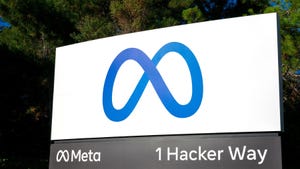Ampere Gears Up to Launch 7nm, 80-Core Arm Chip for Cloud Data CentersAmpere Gears Up to Launch 7nm, 80-Core Arm Chip for Cloud Data Centers
The startup expects to see its new chips run databases and other heavy workloads in hyperscale cloud platforms.

Ampere Computing, the startup designing Arm server processors for cloud data centers led by former Intel president Renee James, is gearing up to launch its second-generation product.
The upcoming 64-bit chip, manufactured using a seven-nanometer process technology, will have 80 processing cores – more than the latest top-of-the-line x86 parts by Intel and AMD – and compete on price and performance with any server processor on the market, Jeff Wittich, Ampere’s senior VP of products, told DCK in an interview for the Data Center Podcast.
He said he expects the largest hyperscale cloud platforms to start sampling the product later this year. “We’re going to be right at the pinnacle of performance for what’s available in the market at that point.”
Listen to our full interview with Ampere’s Jeff Wittich on the Data Center Podcast
Hyperscalers – companies operating global networks of massive data centers, such as Facebook, Google, and Microsoft – have been desperate to have more than one dominant chip supplier (Intel) for their platforms. AMD appears to be well on its way to becoming a real competitor to Intel in processors based on the x86 architecture, especially with the release of its Epyc 2 server chips earlier this year.
Ampere, however, is part of the latest wave of energy behind creating a viable alternative to both Intel’s and AMD’s x86 chips in the data center. Already powering most of the world’s smartphones, Arm Holdings has for years been pushing into the data center space, with numerous companies licensing its architecture to build a server product. Most of those efforts failed.
The conditions today, however, are uniquely favorable for bringing to market an Arm server product, and Ampere is well-positioned to take advantage of the current environment, Wittich said.
Timing Is Everything
Asked why he thought Ampere had better chances of succeeding than others that tried and failed, Wittich said the previous products came too early.
Silicon foundry operators like TSMC, the Taiwanese chip manufacturer that builds chips for Ampere and others, didn’t have the process-technology leadership they have today and couldn’t compete with Intel. Now they can, he said.
Also, “until very recently, the level of performance for Arm still fell a little bit short of what mainstream cloud service providers needed. Now, with Arm v8 and a lot of the current technology, Arm is able to deliver the level of performance that the cloud actually needs.”
The Cloud’s Special Needs
James, the Santa Clara-based startup’s founder and CEO, left Intel in 2016, after nearly three decades there. In 2017 she unveiled her new endeavor, laser-focused on catering to the needs of cloud providers, both in their hyperscale data centers and at their edge locations.
She recruited Wittich, who came to Ampere this May after 15 years at Intel, the last five of which he spent leading the unit that built products for and sold into the cloud-provider market. In that role, Wittich said, he witnessed firsthand the evolution of the cloud platforms’ computing needs and formulated a strategy for catering to those needs.
Hyperscalers “have performance needs that aren’t being met today with the current architecture,” he told us. “They have power efficiency needs that aren’t being met today.” While there have been “reasonable performance gains” in x86 over the last couple years, “performance per watt hasn’t held pace the same way that performance gains have come.”
Listen to our full interview with Ampere’s Jeff Wittich on the Data Center Podcast
Cloud providers also want more processing cores per rack in their hyperscale data centers, along with the ability to deploy the same architecture at the edge, where power and cooling resources are much more constrained, he explained.
They want more performance, but that performance must be delivered in ways they need it. Socket-level performance, for example, is less important to them than having many cores with consistent performance and performance isolation for hosting lots of containers or functions on a single machine, Wittich said.
Hence the focus on increasing the number of cores in Ampere’s second-generation chip, which will go up to 80 cores (Arm Neoverse N1 cores with Ampere modifications). Core count in the top-of-the-line AMD Epyc 2 processor is 64, while the top-of-the-line 2nd Generation Intel Xeon Scalable processor maxes out at 56 cores.
Ampere’s new chips will support both two-socket and single-socket configurations, Wittich said. Their power consumption will range between around 45 watts and more than 200 watts.
From Android Games to Databases
The startup’s first product, eMAG, launched late last year, is a 32-core 64-bit Arm CPU. “It delivers a pretty reasonable performance in a very power-efficient envelope, very TCO effective,” he said about eMAG.
Cloud provider Packet has been deploying the part in its data centers and edge sites and offering it as a bare-metal cloud service. It’s been particularly popular with Android game developers, for whom having Arm servers in their cloud and Arm chips powering their end users’ devices makes the choice a no-brainer.
Wittich brought Hatch, a Finnish Android gaming company and a Packet customer, as an example. Ampere is also working with several companies in China, where “Android in the cloud is a huge use case,” he said.
eMAG has also seen a lot of traction with large carriers deploying servers at the edge of their networks, according to Wittich.
The upcoming part, however, is “what will really take us the next step in seeing Ampere really increase its footprint, expand the workloads that we can go and compete in,” he said. “This isn’t incremental improvement to the previous product. This is really a gigantic leap forward.
“You’re going to start to see deployments in databases, in search, in storage, analytics, you name it – all of the big cloud use cases.”
Listen to our full interview with Ampere’s Jeff Wittich on the Data Center Podcast:
About the Author
You May Also Like







